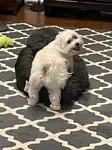What You Need to Know
About Kid Friendly Dogs
So, you’ve done all your homework and made a list of the top kid friendly dogs for your family. Does this mean that your dogs and kids will know how to interact when they first meet? Well, it depends on many things including the age of the children and the temperament of the dog breed.

There are certain dog breeds that are known as kid friendly dogs
(Beagles, Pugs, Labs, Poodles, Golden Retrievers, Cotons de Tulear) and
certain breeds that have reputations for not being good with children
(Pit Bulls, Rottweilers, Chihuahuas, Jack Russell Terriers). This is just a guideline. Poodles can bite and Pit Bulls can be sweet and gentle. Each dog has its own unique personality and temperament.
No matter what age your children are or what breed of dog you have there are certain guidelines that will make living with dogs and kids as safe and happy as possible.
Dogs and kids are so cute together but as an adult, it’s your job to make sure that both your kids and your pets are happy, healthy, and safe. You don’t want your children to be one of the rising statistics of kids who are bitten by a dog.
This is why it’s important to make sure your dogs and kids know how to behave around each other.
Even kid friendly dogs need proper guidance, care, and training.
Here are some valuable tips for parents and kids to help you have a happy and successful relationship with your new dog.
Tips for adults:
- Always supervise young children and animals when they are introduced.
- Never just expect your kids to assume full responsibility for a dog without proper instruction and training.
- Give responsibility to your kids for taking care of your dog, but don’t expect that kids are responsible enough to look after ALL the needs of your dog. As an adult you have to oversee the general care of your pets – making sure they're safe, well fed, happy, and properly trained.
- Family dogs shouldn’t be encouraged to be protective. The best dog for kids is not the dog you want to guard your home.
- Make sure your dog gets plenty of exercise so there’s not a build-up of pent up energy that translates into bad or hyper behavior.
- Proper diet can actually have an impact on your dog’s behavior. Make sure to feed high quality food.
- Make sure your dog is properly socialized so he adapts well to all kinds of people and environmental conditions.
- Training is the key for your kids and your pets. Your dog must know basic obedience commands.
- Understand the body language of dogs when they are feeling stressed or aggressive such as growling, lip licking, snarling, staring, or freezing their bodies. These are indications that they are ready to nip or bite. Even kid friendly dogs can display aggressive behavior so it’s important to recognize the warning signs.
- Be a good role model. Your kids learn from what you do not what you say. Be loving, patient and consistent with your dog and your kids will do the same.
Tips for kids:
- Your pet is not like a toy. Playing is great, but roughness or aggressive playing can teach your dog the wrong message. Be gentle with your dog and if you see that your dog is getting too excited, stop playing for a while until your dog calms down.
- Don’t grab anything from your dog suddenly.
- It’s never a good idea to interrupt a dog while he’s eating or sleeping.
- Make sure you remember to keep all the doors, fences and gates closed so your dog can’t get out and get hurt or lost.
- Treat your dog the same way you want to be treated – with love, patience, and kindness (even when he misbehaves).
- Check out How to Love Your Dog. This is a great web site that will teach you everything you need to know about loving and taking care of your dog.






